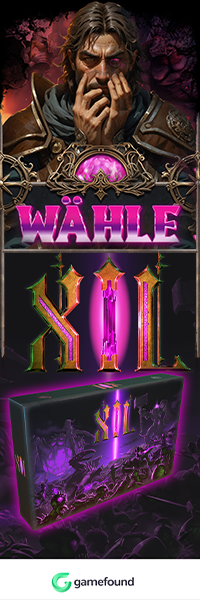AoSRPG: Tree-Revenant Waypiper und Kampfsystem Preview
Es gibt einen weiteren Archetypen für das kommenden Warhammer Age of Sigmar Pen and Paper Rollenspiel von Cubicle7 und eine Vorschau auf das Kampfsystem.
Today we’re revealing the final Sylvaneth Archetype for Age of Sigmar: Soulbound— the Tree-Revenant Waypiper.
Warriors of the Sacred Forests
You are a warrior-spirit of the living wood, and woe betide any who trespass on the sacred forests
The Tree-Revenants are the lethal foot soldiers of the Sylvaneth glades, the standing army of the war-groves. Outside of battle they tend to be sombre beings, with impenetrable customs that no creature not of sap and heartwood could hope to understand, but which to the Tree-Revenant mean everything. Each Tree-Revenant carries in their heartwood the echoes of the warrior lives that preceded it, borne through the generations, soulpod to soulpod, blending with and shaping much of the spirit’s martial style and personality. Seldom does a Tree-Revenant encounter a situation that they have not, somewhere in their ancestral memory, faced and overcome a hundred times before. This spiritual lineage, it is believed, roots all Tree-Revenants with the Protectors of myth, divine guardians whom the Tree-Revenants purport to resemble and seek to honour through adherence to custom and acts of selfless valour.
Attuned to the realmroots of the wyldwood through the divining songs of their waypipes, the Tree-Revenant is able to stalk the spirit paths, allowing them to move unseen wherever living things grow, and strike wherever an enemy might hide.
‘Stay your claws if that is what the song in your heartwood commands. Know that mine bids me to slaughter.’
- Llaethorn of the Gnarlroot Grove
When a Tree-Revenant becomes Soulbound, it is the ending of a line of martial spirits that may well stretch back to the Age of Myth. Forever cut-off thereafter from the soulpod groves of their Glade, their lamentiri are burned away when their spirit is entwined with that of their fellow Soulbound and the energies of the Mortal Realms. To become Soulbound for a Tree-Revenant, then, is to embrace an inevitable final death, yet many do so willingly. While not mindless servants, to a Tree-Revenant the Everqueen’s request may as well be a command. Others find the temptation to think and act of their own will to be reason enough, as might the opportunity to escape from past lives or memories of darkness. For many, however, there is simply acceptance that becoming Soulbound is the single greatest act they can perform in defence of the realms they cherish, and for such a gift no price is too high.
PUT ‘EM UP
In Soulbound, characters have three major combat traits: Melee, Accuracy, and Defence.
Melee is how effective you are in hand-to-hand combat. It is derived from your Body and your Weapon Skill. When making a Melee Attack, you make a Body (Weapon Skill) Test.
Accuracy represents your marksmanship and ability to pick out a target. It is derived from your Mind and your Ballistic Skill. When making a Ranged Attack, you make a Body (Ballistic Skill) Test.
Defence is how hard you are to hit, and how adept you are at avoiding danger. Defence is derived from your Body and your Reflexes Skill.
These traits are rated on a scale we call The Ladder. Ratings range from Poor right up to Extraordinary. When you are making an attack, you compare either your Melee or Accuracy (depending on the type of attack) with the target’s Defence. This determines the difficulty to hit. If you are evenly matched, say with a Good Melee versus a Good Defence, the difficulty to hit is 4. This means any result of 4 and up counts as a hit. If you are one step higher on the ladder, say Good Melee versus an Average Defence, the difficulty would be 3. If you are one step lower on the ladder, say Average Melee versus Good Defence, the difficulty would be 5. If you are two steps or more higher the difficulty is 2, and if you are two steps or more lower the difficulty is 6.
This means that defence and attack aren’t static, and are instead determined by the effectiveness of the combatants. It also means that even the tiniest Grot has a chance of hurting a towering Kurnoth!
POKIN’ AND STABBIN’!
Weapons have different traits and damage ratings, but the successes on your attack are always added to the total damage. If the target is wearing armour, the armour rating is subtracted from the damage dealt. Whatever is leftover reduces the target’s Toughness.
PUSHING AND SHOVING!
As well as making a basic attack, there are plenty of other things you can do on your turn in combat. You can charge, make a called shot, grapple, help and ally, hide, dodge, improvise, or even try to talk to calm things down (not advisable when a Rat Ogor is barreling towards you).
Combat in Soulbound is quick and dynamic, and encourages creativity from players. It allows you to feel like a powerful hero while also providing a constant threat of imminent death — just the way it should be in the Mortal Realms.
Quelle: Cubicle 7






Wer spielt denn sowas? Das dürfte ja selbst dem krassesten DnD Highfantasy Fan zu schräg sein.
Das wird ein wirklich seltsames Rollenspiel.
Ähnlich abgefahren wie Talislanta Seinerzeit.